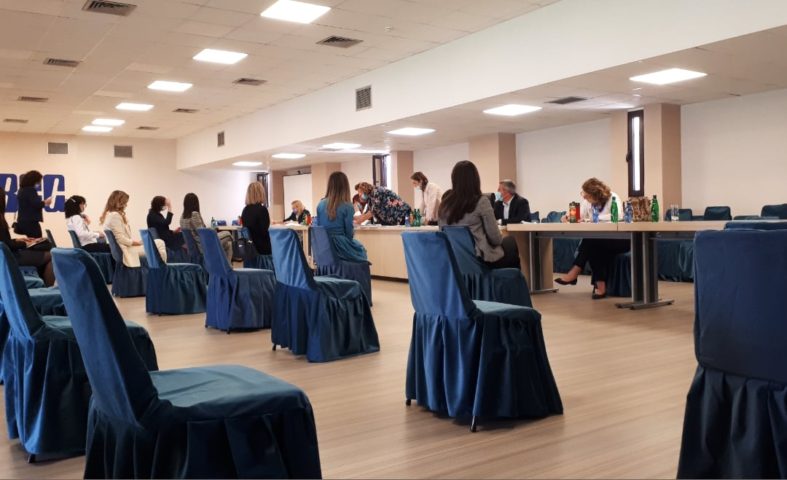
AN END TO PERSONAL DOMINATIONS WITHIN THE JUDICIARY IS A BEGINNING TO FUNDAMENTAL REFORM
02/01/2021
JUDICIAL COUNCIL CONDUCTED TESTING IN ITS PROCEDURE FOR ELECTING JUDGES DESPITE HRA AND CANDIDATE APPEALS
25/01/2021POSTPONE WRITTEN TESTING OF CANDIDATES FOR JUDGES

The Human Rights Action calls on the Judicial Council to postpone the testing of candidates scheduled for January 25 and 26 until the testing procedure is changed so that the risk of abuse is eliminated or at least significantly reduced. HRA also believes that the sitting Judicial Council, composed of members who conducted the selection of candidates for judges in 2019 has lost its legitimacy, and that some new people should elect judges in Montenegro.
The Judicial Council did not learn from previous scandals in the selection of candidates for judges, and, contrary to the announcements, did not improve the rules of procedure so as to ensure transparent and objective selection.
In Montenegro, written testing continues to be conducted by members of Commission for Testing, such that they first obtain four files of adjudicated cases from the jurisdiction of basic courts, whose judgments are available on the internet, after which one case is drawn by lot from the criminal and one case from the civil area on the basis of which the participants in the competition write judgments.
This way of testing was especially criticized after the last testing scandal in March 2020, when some participants cheated on the test by copying the verdicts from the Internet.
At that time, the professor of international law and former judge of the European Court of Human Rights, Nebojša Vučinić, suggested that the Judicial Council formulate hypothetical cases and not use cases available on the Internet, thus preventing cheating.
In Bosnia and Herzegovina, for example, written testing is automated, so that the risk of cheating is minimised. There, the testing is conducted in electronic form, so that the algorithm itself compiles the test from a database of test tasks, by a method of random selection, 24 hours before the test at the earliest. After such a test, the assessment is performed automatically and immediately after the end of the test, a preliminary result containing the number of points scored appearing on the candidate’s screen.
The High Judicial and Prosecutorial Council of Bosnia and Herzegovina has created a special electronic database of examination tasks, which is regularly updated by their Standing Committee. The database is accessible only to the staff of the Secretariat and members of the Standing Committee. Each access to the database is recorded by stating who accessed it, as well as the date and actions taken during access.
Following the March 2020 testing scandal, the HRA called on the Judicial Council to explain to the public exactly what happened, why it happened, to prevent those who cheated from becoming judges, and to take all necessary steps to prevent such events from happening again. The Judicial Council subsequently filed a criminal complaint which was dismissed in October 2020. In addition, the Rules of Procedure have been amended regarding the selection procedure, so that it is now mandatory for at least one member of the Commission for testing and one representative of the Secretariat to be present in the testing room, unlike the previous decision when all members of the Commission for testing had to be present. The use of portable USB memory and the Internet is not allowed now, but it is possible to leave the test room for up to five minutes. Instead of professional literature, candidates can only use laws and other regulations. The candidate will not be evaluated if it is determined that he used illicit means and that is all. These novelties in the Rules of Procedure of the Judicial Council do not provide the necessary guarantees against cheating on the written test.
A similar situation occurred in 2014, when some candidates cheated on the test for judges with the help of technical aids “bugs”. The Council did not determine who cheated on the exam, explaining that the tests were signed with codes, and then it was decided to offer the candidates another chance and to have everyone repeat the test, and even then the Council pointed out that precautions would be taken in the future to prevent a similar scandal, but this was clearly not done because a similar scandal was repeated in 2020.
HRA was also informed about the remarks on procedural omissions during the election of new members of the Commission for testing, which were also pointed out by the participants in the competition for judges in a letter they recently sent to the Minister of Justice, Human and Minority Rights. The letter states that the members of the Commission were not elected by secret voting, in accordance with the Rules of Procedure, and that a decision on the appointment of new members had to be made, and not a decision on the replacement of members. It was decided that the Commission for testing consists of Judge Verica Sekulić, as president, Judge Dragan Babović and lawyer DobricaŠljivančanin as its members.
The current composition of the Judicial Council has been working in the status of disputed legitimacy for over two years. The HRA, together with colleagues from the Institute Alternative and MANS, filed criminal charges against all members of the Judicial Council for falsifying grades for the interview during the election of judges in 2019, in the same competition that was overturned by one of the participants, Ivan Vukićević. We have demanded that all members of the Judicial Council resign because we believe that after such actions they no longer have the necessary legitimacy to elect judges.
The written test, scheduled for January 25 and 26, is scheduled after the last session in 2020, at which the Judicial Council, after two hours of deliberation, decided to implement the decision of the Administrative Court and repeat the written test, not just interviews as previously decided. The HRA then asked the Judicial Council to consistently implement the decision of the Administrative Court, which found irregularities during the written test, and a number of candidates sent a protest letter to the Judicial Council and the Minister of Justice, Vladimir Leposavić, for the same reason.






 English
English